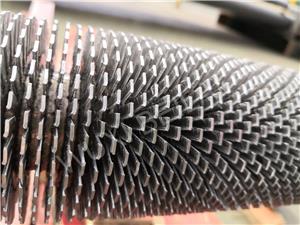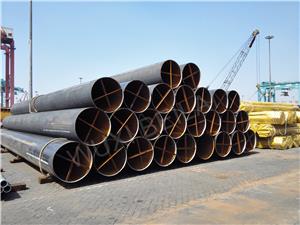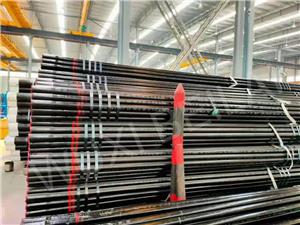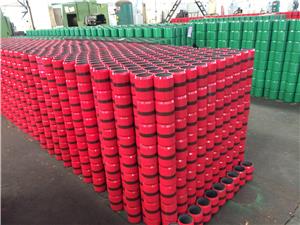The role and significance of alloy steel tubes in modern industry
Alloy steels are one of the most widely used materials in a wide range of applications, particularly in industries where high strength, heat and pressure resistance are essential.Alloy steels are particularly useful in industries such as power generation, oil and gas, petrochemicals and heavy machinery manufacturing.Today we are going to discuss A335 alloy steel pipes and alloy steel boiler tubes among alloy steel components.
1. Understanding Alloy Steel Boiler Tubes
Boiler tubes play a critical role in heat exchangers and boilers by transporting water, steam, and other fluids under pressure. Alloy steel boiler tubes are designed to withstand high temperatures and pressures in the most demanding industrial environments. These tubes are made from a combination of iron and alloying elements, such as chromium, molybdenum, and vanadium, which enhance their mechanical properties, heat resistance, and resistance to corrosion.
Key Properties of Alloy Steel Boiler Tubes
The fundamental properties that make alloy steel boiler tubes ideal for demanding applications include:
High Temperature Resistance: These tubes are designed to handle extremely high temperatures without undergoing deformation. This is particularly vital in industries where steam or other fluids are heated to high pressures.
Corrosion Resistance: The alloying elements used in the manufacturing of these tubes, such as chromium and nickel, significantly improve the tubes’ resistance to oxidation, pitting, and corrosion, ensuring a longer lifespan.
Strength and Toughness: Alloy steel boiler tubes exhibit exceptional mechanical properties, including high tensile strength and toughness. This makes them ideal for withstanding the internal and external pressures found in boiler systems.
Creep Resistance: The ability to resist deformation under high stress and high temperature is crucial for maintaining the structural integrity of steam boilers and heat exchangers. The addition of elements like molybdenum and vanadium plays a key role in improving creep resistance.
Applications of Alloy Steel Boiler Tubes
Alloy steel boiler tubes are used in a variety of applications, primarily in:
Power Plants: Steam boilers and heat exchangers in power plants require robust tubes that can handle extreme operating conditions. Alloy steel boiler tubes ensure the efficient transfer of heat while maintaining the strength and integrity of the system over time.
Petrochemical and Chemical Industries: Boilers and heat exchangers in these industries operate in corrosive environments, making the superior corrosion resistance of alloy steel tubes highly beneficial.
Marine Applications: In marine environments, where exposure to saltwater and high pressures is common, alloy steel boiler tubes provide the necessary durability to withstand these harsh conditions.
Oil & Gas Industry: The oil and gas industry, especially in upstream and downstream processes, benefits from the high-temperature resistance and pressure-bearing capacity of alloy steel boiler tubes.
2. A335 Alloy Steel Pipe: a high-performance steel pipe
A335 Alloy steel pipe is manufactured to meet stringent mechanical and chemical properties, ensuring its performance in challenging conditions.The designation "A335" refers to the specification established by the American Society for Testing and Materials (ASTM). This standard outlines the requirements for alloy steel pipe, particularly those used in high-temperature and high-pressure applications. The material is commonly found in two key grades: P1 and P22, though other grades such as P5 and P91 are also available. These materials are characterized by a combination of alloying elements such as chromium, molybdenum, and vanadium, which offer exceptional performance in critical environments.
Properties and Characteristics of A335 Alloy Steel Pipe
Like alloy steel boiler tubes, A335 Alloy Steel Pipe is designed to offer several key characteristics that make it suitable for industrial applications under extreme conditions:
High-Temperature Performance: The A335 Alloy Steel Pipe is designed to perform in applications where high temperatures, exceeding 500°C, are common. The addition of elements like chromium enhances its ability to resist oxidation and scaling at high temperatures.
Pressure Resistance: One of the key features of A335 pipes is their ability to withstand high pressure. This makes them ideal for use in industries such as oil and gas, where they are subjected to extreme internal pressures.
Corrosion Resistance: The presence of chromium and other alloying elements ensures that A335 pipes have excellent resistance to corrosion and oxidation. This property is especially critical in environments where pipes are exposed to aggressive fluids and gases.
Flexibility and Durability: A335 Alloy Steel Pipe offers good flexibility, making it suitable for systems that require movement or expansion. Additionally, it is durable enough to handle long service lives, even in harsh conditions.
Applications of A335 Alloy Steel Pipe
A335 Alloy Steel Pipe is primarily used in applications that require both high-temperature and high-pressure capabilities. Common uses include:
Power Generation: A335 pipes are widely used in the construction of steam lines, boiler tubes, and heat exchangers in power plants. These pipes must be capable of withstanding high pressures and temperatures without failing, ensuring a consistent energy supply.
Petrochemical and Refining Industries: In the petrochemical and refining industries, pipes are often exposed to high temperatures and corrosive substances. A335 Alloy Steel Pipe provides the necessary durability and resistance to ensure the safe and efficient operation of these systems.
Oil and Gas: The oil and gas industry uses A335 pipes in high-pressure, high-temperature applications such as pipelines, refinery equipment, and offshore platforms.
Heat Exchangers: A335 alloy steel pipes are also found in heat exchangers, where they help transfer heat between fluids while maintaining structural integrity under thermal stress.
With their ability to withstand extreme environments and last for extended periods, alloy steel products are likely to remain a cornerstone in industrial applications for many years to come.




